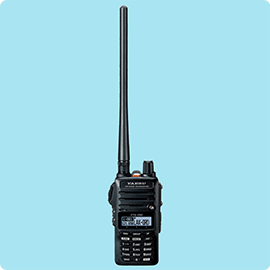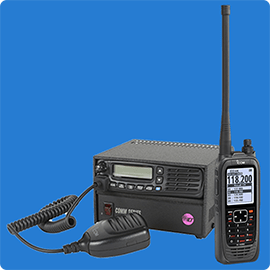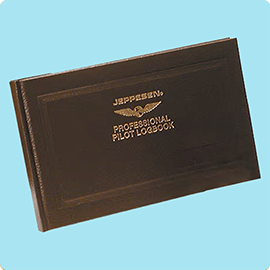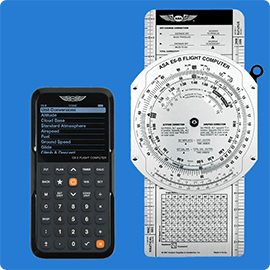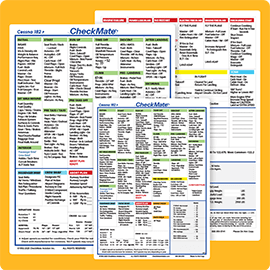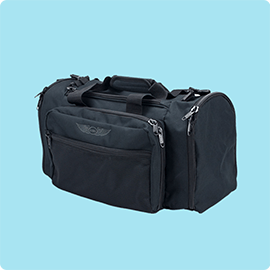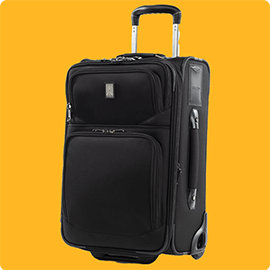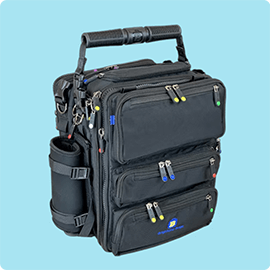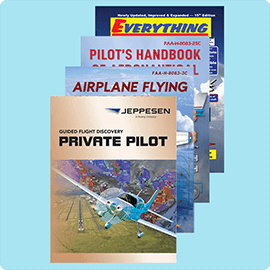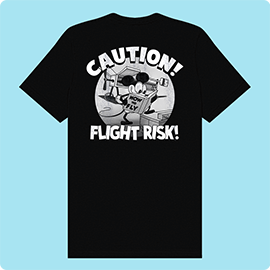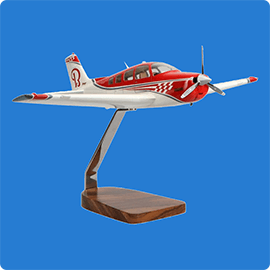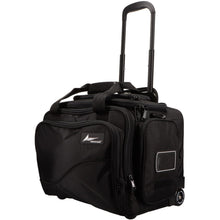How to Decide if Being an Airline Pilot is Right for You
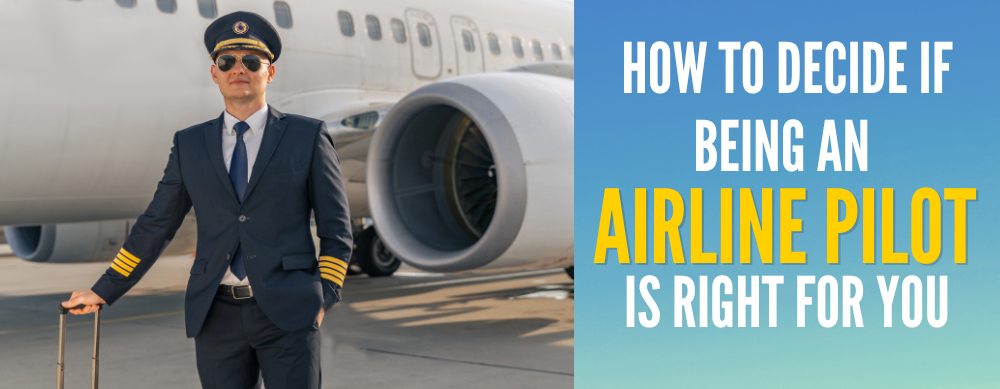
Featured Pilot Gear
Browse our selection of high-quality pilot supplies! Your purchase directly supports our small business and helps us continue sharing valuable aviation content.
Becoming an airline pilot is the ultimate dream for many flight students. Along with the thrill of traveling on a daily basis, there is also the financial security that comes with the job.
Compared to other professions such as becoming a doctor or a lawyer, the training time and transition to working for an airline company is significantly shorter. Keep in mind, like any occupation, being an airline pilot has its own set of challenges.
If you're curious about this career path, let's examine the pros and cons of being an airline pilot to determine if it lines up with your personal goals and interests.

The Pros
As firm believers in the notion of indulging in dessert before the main course, we shall dive headfirst into the many benefits and advantages that come with being an airline pilot.
1. Exciting Career Path
Let's be real, choosing to become an airline pilot is a decision that promises an exhilarating and fulfilling career. It's a job with a lot of appeal; the role entails flying passengers to various destinations across the globe, offering the chance to experience different cultures, a diversity of cuisines, and ever-changing landscapes.
What's not to love about that?
Professional pilots gain the absolute pleasure of operating some of the most advanced and sophisticated aircraft, providing them with amazing views from angles a majority of people will never get to see.
Airline pilots have described that they feel the rush of joy from being able to fly an airliner craft, but they also express as respect and the reverence of purpose behind their role to protect the lives of others.
But being a pilot goes beyond just the excitement of flying and the responsibility of the role.
It requires a lot of hard work, dedication, and most of all, discipline. Airline pilots in the United States can undergo up to over 1500 hours worth of flight time and training just to be able to qualify for the role of first-officer.
It's a lot of time spent in the air, especially when you consider that the first 250 flight hours pilots need to obtain their commercial license are ones they have to fund themselves. They must prove that they have excellent communication skills and can make quick decisions during emergency situations.
Despite these challenges, pilots often describe having pride, joy and appreciation for their job. Each flight offers a new destination and a new set of challenges, making it a career that never gets boring or routine.
So if you have dreamt of exploring the world from a whole new perspective, being an airline pilot may just the thing for you.
2. Job Security in the Aviation Industry
The aviation industry has long been known for being a travel industry, flying is the main way to travel if you want to get somewhere quickly. And with a consistent demand for qualified pilots to meet the ever-growing needs of airlines everywhere in the world. This demand is only expected to continue in the next several coming years since most people choose air travel as their preferred mode of transportation.
Airline pilots, in particular, enjoy a relatively high level of job security in this industry. The airlines work very much like the military, they reward seniority and those who choose to stay with them by giving them competitive salaries, offering comprehensive benefits packages, and even presenting opportunities for advancement within the company.
The aviation industry typically offers a stable career path for those interested in pursuing a job within it. With the continuous growth of air travel, there will always be a need for qualified pilots.

3. Competitive Salary and Benefits
Because of their extensive training and responsibility, airline pilots are typically paid extremely well for their work. Major airlines often "compete" with each other by offering bonuses and high salaries in order to attract the best pilots to join their team.
The longer a pilot stays with the airline, the more they are rewarded for their loyalty and seniority through raising both their rank and their salary.
They also receive a range of great benefits such as:
- Sign-on Bonuses (depending on the airline)
- Health insurance
- Retirement plans
- Travel perks
As they gain experience and climb the ranks, pilots can access even more incentives, including bonuses and profit-sharing opportunities. The airlines want to keep their experienced and knowledgeable pilots.
Pilots report feeling a good amount of job satisfaction and typically, when a pilot chooses an airline to work for, they tend to remain with that company for an average tenure of 10-15 years.
4. Technical Knowledge and Skill Development
While the life of an airline pilot is filled with perks, it requires a large amount of hands-on training and the ability to pass multiple exams. While to some this might seem like a con, I believe that it is actually a huge advantage.
The training not only helps develop skills necessary for flying safely, but also provides valuable knowledge and experience. Being able to fly safely will always be a positive aspect of the job.
To become a commercial pilot you will need to master aircraft operations, radio communications, flight navigation, crew management and safety procedures.
Many pilots gain the knowledge and skills required for their job by completing aviation-based degree programs or attending flight schools.
These challenging training programs offer a thorough education and practical experience, preparing pilots to navigate the complexities of the airline industry.
5. Fulfilling Work
You will find many fulfilling career opportunities in the aviation industry. Being able to safely transporting passengers to their desired destinations is an incredibly rewarding feeling.
Whether you choose to work as a pilot, flight attendant, air traffic controller, or in another role within the industry, you will find endless opportunities for growth and ultimately, true job fulfillment.

The Cons
Of course, like any job, being a pilot also has its cons. The long hours and time away from family can be tough, and the constant pressure to perform at the highest level can be mentally and physically exhausting.
Let's get into the details of these cons.
1. High Costs of Training
I'm not going to sugar-coat this, it is expensive to become an airline pilot, especially depending on the financial circumstances you may come from. Along with costly expenses such as flight training fees, instructor fees, examination costs, and the price of obtaining necessary licenses, aspiring pilots must also face the overwhelming upfront investment required for training programs, a degree or cadet courses.
Here are some cost examples:
Private Pilot Certificate (PPC):
-
Cost: $8,000 - $20,000
-
Flight Hours: 40-70 hours
Instrument Rating (IR):
-
Cost: $8,000 - $15,000
-
Flight Hours: An additional 40-50 hours
Commercial Pilot License (CPL):
-
Cost: $20,000 - $30,000
-
Flight Hours: 150-250 hours (including previous PPL and IR hours)
Multi-Engine Rating (ME):
-
Cost: $5,000 - $10,000
-
Flight Hours: An additional 10-20 hours
Certified Flight Instructor (CFI) Rating:
-
Cost: $5,000 - $8,000
-
Flight Hours: Around 15-30 hours
Certified Flight Instructor - Instrument (CFII) Rating:
-
Cost: $3,000 - $6,000
-
Flight Hours: An additional 10-20 hours
Airline Transport Pilot (ATP) License:
-
Cost: $5,000 - $7,000 (exam fees and other costs)
-
Flight Hours: Usually requires a total of 1,500 hours of flight time, including the specific requirements for cross-country, night, and instrument flight time.
(Keep in mind that these prices are just estimates.)
Many pilots find themselves having to take out hefty loans, max-out credit cards, borrow funds or seek out scholarships just to afford finishing their flight training.
While this financial barrier to entry can discourage many individuals from pursuing their dream of flying, some see the salary offered by the airlines as incentive enough to shoulder these costs.
2. Demanding Work Schedule
The life of an airline pilot is often filled with long hours and irregular schedules, leaving them exhausted and drained. Early mornings, late nights, weekends, and holidays are all fair game for their demanding job. Gaining a better schedule takes time and seniority in the company to achieve.
While dealing with these strict scheduling requirements, pilots must also maintain a calm demeanor under immense pressure, which can add to their physical and/or mental fatigue. Keeping a healthy work-life balance with their spouses and children can be a difficult feat for many airline pilots.
3. Health Concerns and Lifestyle Challenges
On top of keeping up with everything else pilots must constantly meet strict medical requirements. These regulations could potentially limit eligibility based on health conditions or even lifestyle choices. The process of getting to the airlines and the financial burden of debt can also have a big impact on a pilot's well-being.
Before flying, pilots must be adequately rested and ask themselves an important question: "Am I SAFE?" This acronym stands for various aspects of a pilot's mental and physical health that must be checked before flying. During flight training, it can be challenging to pass this checklist due to the high levels of stress and financial strain involved.
4. Weather Conditions and Technical Challenges
Pilots have to train for challenging weather conditions and for emergencies. Some of the emergency procedures in the beginning stages of flight training can be difficult for new students. You need to have a calm mind and a strong stomach to handle the ups and downs with learning power-on and power-off stalls.
Plus, pilots learn how to deal with diverse weather conditions, such as turbulence, storms, and low visibility. These environmental factors can pose big obstacles during flights, requiring pilots to have high expertise and quick decision-making skills in order to safely get through unexpected situations or emergencies.
5. You Never Stop Training
Being an airline pilot requires a career-long commitment to learning and staying up-to-date with FAA regulatory standards. This includes constantly undergoing training and reviews, and making sure that their licenses are current and their skills stay sharp as a pin.
Basically, a pilot never truly stops learning or training, as the safety of passengers and crew members relies heavily on their continuous pursuit of mastering their craft.
Takeaway
When it comes to an airline pilot's pros and cons, ultimately it's a matter of personal perspective. While it's true that the potential salary for an airline pilot is substantial and can be appealing to those seeking a high-paying career, without a true passion for flying, this profession may prove challenging.
True pilots possess a deep love for flying and a genuine enthusiasm for being in the sky. They take their job seriously and prioritize knowledge and safety. For them, it's more than just a source of income - it's a lifelong dream fulfilled.
However, if your heart is not set on pursuing a career in the airlines, the challenges may outweigh the rewards. This role requires dedication and can be demanding and financially cumbersome in the beginning, but for those who have been captivated by aviation and feel at home in the skies, the advantages far surpass any difficulties they may encounter.
Interested in Aviation-based Careers?
Our guides are designed to help!
Did you find this article helpful?
Do you think we missed anything important? Let us know in the comments below!





